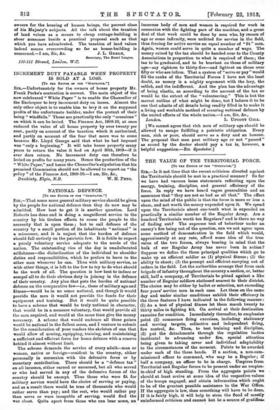NATIONAL DEFENCE.
[To THE EDITOR 07 THE "SPECTATOR."] SIR,—That some more general military service should be given by the people for national defence than they do now may be admitted. How best to get it is another question. Lord Roberts has done and is doing a magnificent service to the country by his tireless efforts to rouse the people to the necessity that is upon them ; but to call defence of the country by a small portion of its inhabitants " national" is a misnomer, and it is unjust that the burden of defence should fall entirely on the patriotic few. It is futile to expect a purely voluntary service adequate to the needs of the nation. The outstanding vice of the day is unadulterated selfishness—the disinclination of the individual to shoulder duties and responsibilities, which he prefers to leave to the other man whenever he can. Thus with military service, as with other things, it is left to the few to try to do what should be the work of all. The question is how best to induce or compel all to do their obvious duty in joining in the defence of their country. Any plan that puts the burden of national defence on the comparative few—i.e., those of military age and fitness—would be in no sense national, and though it would provide the men it would not provide the funds for their equipment and training. But it would be quite possible to have a scheme that would be truly national in character, that would be in a measure voluntary, that would provide all the men required, and would at the same time give the money necessary. A scheme that would embrace all these points would be national in the fullest sense, and I venture to submit for the consideration of your readers the skeleton of one that would allow of arming, equipping, training, and maintaining a sufficient and efficient force for home defence with a reserve behind it almost without limit.
The scheme demands the service of every adult—man or woman, native or foreign—resident in the country, either personally in connexion with the defensive force or by monetary contribution. There should be a " defence tax " on all incomes, either earned or unearned, but all who served or who had served in any of the defensive forces of the country should be exempt. Thus those who were fit for military service would have the choice of serving or paying, and as a result there would be tens of thousands who would rather serve than pay; and the rest, who would rather pay than serve or were incapable of serving, would find the war chest. Quite apart from those who can bear arms, an immense body of men and women is required for work in connexion with the fighting part of the machine, and a great deal of that work could be done by men who, by reason of age or some infirmity, were unfitted for service in the field, thus freeing for active service an equal number of "fit" men. Again, women could servo in quite a number of ways. The money raised by the tax should be banded over to the County Associations in proportion to what is required of them; the tax to be graduated, and to be heaviest on those of military age—say eighteen to thirty-five—and lightest on those over fifty or who are infirm. That a system of "serve or pay" would fill the ranks of the Territorial Forces I have not the least doubt, as money is a mighty argument with the lazy, the selfish, and the indifferent. And the plan has the advantage of being elastic, as according to the amount of the tax so would be the extent of the " volunteering." This is but the merest outline of what might be done, but I believe it to be one that admits of all details being readily filled in to make it a living and workable method of securing national defence by the united efforts of the whole nation.—I am, Sir, &c., j We cannot agree that rich men of military age should be allowed to escape fulfilling a patriotic obligation. Every man, rich or poor, should serve as a duty and an honour. The proposal that men past military age or not "passed" as sound by the doctor should pay a tax is, however, a helpful suggestion.—ED. Spectator.]














































 Previous page
Previous page